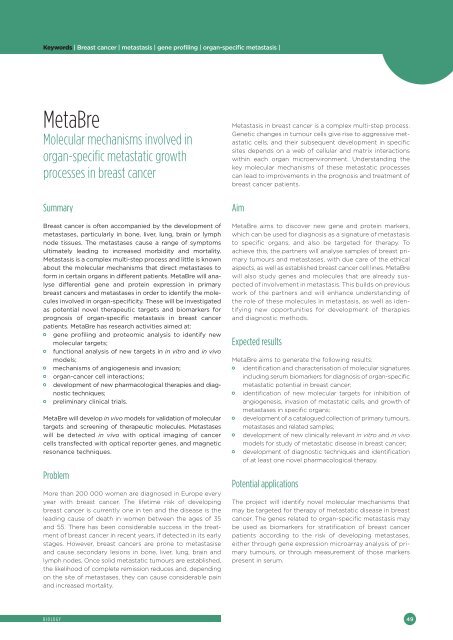You also want an ePaper? Increase the reach of your titles
YUMPU automatically turns print PDFs into web optimized ePapers that Google loves.
Keywords | Breast cancer | metastasis | gene profi ling | organ-specifi c metastasis |<br />
MetaBre<br />
Molecular mechanisms involved in<br />
organ-specifi c metastatic growth<br />
processes in breast cancer<br />
Summary<br />
Breast cancer is often accompanied by the development of<br />
metastases, particularly in bone, liver, lung, brain or lymph<br />
node tissues. The metastases cause a range of symptoms<br />
ultimately leading to increased morbidity and mortality.<br />
Metastasis is a complex multi-step process and little is known<br />
about the molecular mechanisms that direct metastases to<br />
form in certain organs in diff erent patients. MetaBre will analyse<br />
diff erential gene and protein expression in primary<br />
breast cancers and metastases in order to identify the molecules<br />
involved in organ-specifi city. These will be investigated<br />
as potential novel therapeutic targets and biomarkers for<br />
prognosis of organ-specifi c metastasis in breast cancer<br />
patients. MetaBre has research activities aimed at:<br />
• gene profi ling and proteomic analysis to identify new<br />
molecular targets;<br />
• functional analysis of new targets in in vitro and in vivo<br />
models;<br />
• mechanisms of angiogenesis and invasion;<br />
• organ-cancer cell interactions;<br />
• development of new pharmacological therapies and diagnostic<br />
techniques;<br />
• preliminary clinical trials.<br />
MetaBre will develop in vivo models for validation of molecular<br />
targets and screening of therapeutic molecules. Metastases<br />
will be detected in vivo with optical imaging of cancer<br />
cells transfected with optical reporter genes, and magnetic<br />
resonance techniques.<br />
Problem<br />
More than 200 000 women are diagnosed in Europe every<br />
year with breast cancer. The lifetime risk of developing<br />
breast cancer is currently one in ten and the disease is the<br />
leading cause of death in women between the ages of 35<br />
and 55. There has been considerable success in the treatment<br />
of breast cancer in recent years, if detected in its early<br />
stages. However, breast cancers are prone to metastasise<br />
and cause secondary lesions in bone, liver, lung, brain and<br />
lymph nodes. Once solid metastatic tumours are established,<br />
the likelihood of complete remission reduces and, depending<br />
on the site of metastases, they can cause considerable pain<br />
and increased mortality.<br />
BIOLOGY<br />
Metastasis in breast cancer is a complex multi-step process.<br />
Genetic changes in tumour cells give rise to aggressive metastatic<br />
cells, and their subsequent development in specifi c<br />
sites depends on a web of cellular and matrix interactions<br />
within each organ microenvironment. Understanding the<br />
key molecular mechanisms of these metastatic processes<br />
can lead to improvements in the prognosis and treatment of<br />
breast cancer patients.<br />
Aim<br />
MetaBre aims to discover new gene and protein markers,<br />
which can be used for diagnosis as a signature of metastasis<br />
to specifi c organs, and also be targeted for therapy. To<br />
achieve this, the partners will analyse samples of breast primary<br />
tumours and metastases, with due care of the ethical<br />
aspects, as well as established breast cancer cell lines. MetaBre<br />
will also study genes and molecules that are already suspected<br />
of involvement in metastasis. This builds on previous<br />
work of the partners and will enhance understanding of<br />
the role of these molecules in metastasis, as well as identifying<br />
new opportunities for development of therapies<br />
and diagnostic methods.<br />
Expected results<br />
MetaBre aims to generate the following results:<br />
• identifi cation and characterisation of molecular signatures<br />
including serum biomarkers for diagnosis of organ-specifi c<br />
metastatic potential in breast cancer;<br />
• identifi cation of new molecular targets for inhibition of<br />
angiogenesis, invasion of metastatic cells, and growth of<br />
metastases in specifi c organs;<br />
• development of a catalogued collection of primary tumours,<br />
metastases and related samples;<br />
• development of new clinically relevant in vitro and in vivo<br />
models for study of metastatic disease in breast cancer;<br />
• development of diagnostic techniques and identifi cation<br />
of at least one novel pharmacological therapy.<br />
Potential applications<br />
The project will identify novel molecular mechanisms that<br />
may be targeted for therapy of metastatic disease in breast<br />
cancer. The genes related to organ-specifi c metastasis may<br />
be used as biomarkers for stratifi cation of breast cancer<br />
patients according to the risk of developing metastases,<br />
either through gene expression microarray analysis of primary<br />
tumours, or through measurement of those markers<br />
present in serum.<br />
49
















